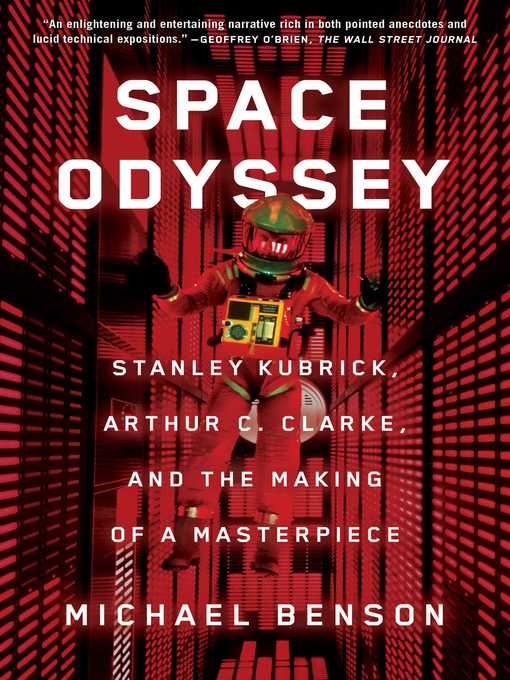
Space Odyssey
Stanley Kubrick, Arthur C. Clarke, and the Making of a Masterpiece
کتاب های مرتبط
- اطلاعات
- نقد و بررسی
- دیدگاه کاربران
نقد و بررسی

February 15, 2018
A fascinating, detail-rich account of the long slog to make the science-fiction masterpiece 2001: A Space Odyssey.Stanley Kubrick (1928-1999), writes Benson (Cosmigraphics: Picturing Space Through Time, 2014, etc.), was a slayer of genres. He reinvented film noir, the costume drama, the horror film, and the war movie. With 2001, over the course of seven years of hard work, he aimed to put his mark on science fiction, with his own unmistakable twist: "Kubrick's method was to find an existing novel or source concept and adapt it for the screen, always stamping it with his own bleak--but not necessarily despairing--assessment of the human condition." He found his sources in two places: the work of British science-fiction writer and technologist Arthur C. Clarke and the Homeric Odyssey. In the end, as Benson capably demonstrates, both those sources faded into the background. The Odyssey is perhaps best echoed by the deaths of all the crew members of Discovery, prompting Clarke to write in his journal, "after all, Odysseus was the sole survivor." A couple of years after the film was released, Clarke recalled that it reflected 90 percent Kubrick's genius, 5 percent the work of the special effects crew, and 5 percent his own contribution. That assessment was too modest, but Benson runs with the notion that this was Kubrick's film through and through, and each minute of screen time reflected weeks of work and thought as well as many missteps and rethinkings (voice-over narration throughout, anyone?). The author turns in some memorable phrases--for instance, in his telling, the space between the known and the unknown is "that place science is always probing like a tongue exploring a broken tooth." More importantly, it is the often fraught episodes of interaction between Kubrick and a phalanx of collaborators and contributors, most of them now forgotten, that drive this endlessly interesting narrative.Essential for students of film history, to say nothing of Kubrick's most successful movie.
COPYRIGHT(2018) Kirkus Reviews, ALL RIGHTS RESERVED.

March 5, 2018
Benson (Otherworlds) celebrates the 50th anniversary of the classic SF film 2001: A Space Odyssey with this wide-ranging, if somewhat lopsided, chronicle of the collaboration between director Stanley Kubrick and novelist-turned-screenwriter Arthur C. Clarke. It plays out as a straightforward production history but one set apart by the project’s massive scale and extended gestation period, from Kubrick making first contact with Clarke in 1964, with a two-page letter proposing “doing the proverbial ‘really good’ science fiction movie,” to the film’s 1968 release. Unfortunately, Benson struggles to cover his protracted story, which is alternately sketchy and repetitive. Key figures, such as special effects expert Douglas Trumbull and actor Keir Dullea, are introduced quickly only to disappear for long stretches (helpfully, Benson does includes a list of major characters). In the end, this is very much Clarke’s story. Even after 500 pages, the reserved, controlling Kubrick feels like a distant figure. Clarke emerges far more vividly, with Benson, who befriended Clarke near the end of his life, offering a uniquely privileged glimpse of the author’s personality—“an earnest manner leavened by his quick wit”—and day-to-day life as a British expat in Sri Lanka. But readers will be disappointed to expend this much time on 2001 and still come away knowing only part of the story.

April 1, 2018
Stanley Kubrick's 2001: A Space Odyssey is widely regarded as a significant, era-defining work of art and one of the most influential films ever made. Writer/photographer/filmmaker Benson provides a highly detailed, comprehensive account of the 1968 film, noting Kubrick's early directing experiences; describing the first meeting between Kubrick and Arthur C. Clarke, the author of 2001, the novel on which the movie is based; chronicling the years spent on film production, special effects, and set construction; and situating the final work within the context of film history. Benson interviewed Clarke, Kubrick's widow, Christiane, and many others connected to the film, all of which lends a richness to the narrative and helps shade in the details of the director's interactions during the film's conception phase and while on set. Benson starts out with a comparison to Homer's Odyssey and James Joyce's Ulysses, and methodically documents how Kubrick drew inspiration from a range of sources to adapt for the screen. By the end, the author makes a compelling case that 2001: A Space Odyssey is both uniquely Kubrick's film and utterly original. VERDICT Essential for sf fans, Kubrick enthusiasts, and film history buffs.--Meredith Powers, York Coll., Brooklyn
Copyright 2018 Library Journal, LLC Used with permission.

























دیدگاه کاربران